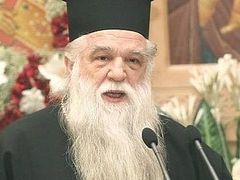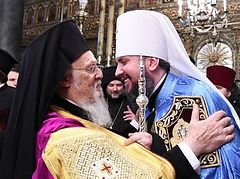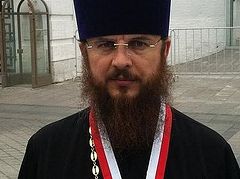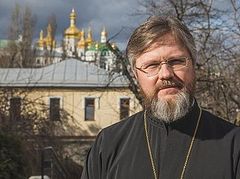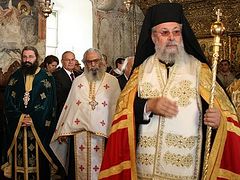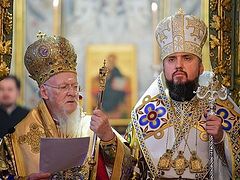Kythira, Greece, September 24, 2019
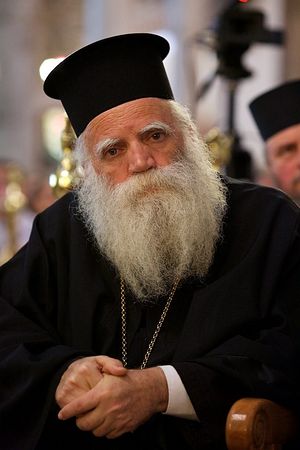 Photo: pravoslavie.ru The granting of autocephaly to the so-called “Orthodox Church of Ukraine” (OCU) was lawlessly done under the pressure of geopolitical interest and deeply split not only the Ukrainian people, but also the Local Orthodox Churches, the Holy Mountain, and the Synod of the Greek Orthodox Church, His Eminence Metropolitan Seraphim of Kythira and Antikythera of the Greek Orthodox Church believes, as he wrote in a statement published on the Greek site vimaorthodoxias.gr.
Photo: pravoslavie.ru The granting of autocephaly to the so-called “Orthodox Church of Ukraine” (OCU) was lawlessly done under the pressure of geopolitical interest and deeply split not only the Ukrainian people, but also the Local Orthodox Churches, the Holy Mountain, and the Synod of the Greek Orthodox Church, His Eminence Metropolitan Seraphim of Kythira and Antikythera of the Greek Orthodox Church believes, as he wrote in a statement published on the Greek site vimaorthodoxias.gr.
As he has publicly said before, the wisest solution to the Ukrainian debacle created by Constantinople’s ill-conceived and clumsy interference there would be to entrust the issue to a pan-Orthodox council of primates and representatives of the Local Churches. Met. Seraphim is in good company, as Synods, primates, and hierarchs from throughout the entire Orthodox world have continually called for a pan-Orthodox council to be called, though Patriarch Bartholomew has continually refused to hear the entreaties of his brother bishops.
Met. Seraphim has also called on his brother hierarchs in the Greek Church not to concelebrate with hierarchs and clergy from the schismatic OCU, as several hierarchs of the Greek Church have already done, lawlessly, as the Greek Synod has not entered into communion with the nationalist schismatics from Ukraine.
His Eminence was a member of the Standing Synod during the 162nd Synodal period, which ended just late last month. According to Met. Seraphim, the Ukrainian question dominated the Synod’s time throughout the period. At its late August meeting, the Synod discussed whether the Patriarch of Constantinople has the right to proclaim autocephaly only over his own territories, or wherever he pleases, and whether he can hear appeals from bishops only of his own Patriarchate, or from anywhere in the Orthodox Church—in this case, “Patriarch” Philaret Denisenko, who had been defrocked, excommunicated, and anathematized by the Russian Church, and “Metropolitan” Makary Maletich and the other “hierarchs” of the “Kiev Patriarchate” and the “Ukrainian Autocephalous Orthodox Church,” who the Patriarchate of Constantinople received without any ecclesiastical court review of their cases.
The hierarchs also discussed whether Pat. Bartholomew violated the requirements and conditions of ecclesiology by granting a tomos of autocephaly to schismatics who have no ordination and who were given over to anathema.
According to Met. Seraphim, the Synod was divided, largely between the metropolitans of the “New Lands” and those of the Greek Church proper. The “New Lands”—Crete, the Dodecanese Islands, and northern Greece—which were annexed to Greece at the end of the Balkan War of 1912, are in a situation unique in the entire Orthodox world, where they are part of the Patriarchate of Constantinople, but are administered as part of the Greek Orthodox Church.
That is, the Synod of the Greek Church is populated by a number of hierarchs who are loyal to another Local Church. The “New Lands” situation demonstrates that the Patriarchate of Constantinople does not hold to the “independent state-independent Church” model.
The hierarchs of the “New Lands” and one hierarch of the Greek Church proper believed the Patriarch of Constantinople has the rights in question, thus they see no problem in granting autocephaly to the schismatics of Ukraine, Met. Seraphim writes. They had received letters in January from Constantinople assuring them there were no canonical problems, and that they should agree to the provision of autocephaly, which formally took place on January 6.
The remaining five metropolitans from “old Greece” and the oldest members of the Permanent Synod were more cautious about recognizing unlimited rights for Constantinople.
As Met. Seraphim explains, he himself objected to the Synod’s proposal to write a message that the Patriarch of Constantinople has the right to grant autocephaly and that His Beatitude Archbishop Ieronymos of Athens and All Greece, the primate of the Greek Orthodox Church, has the privilege to deal with the issue. In the end, the Synod did release such a message.
Adhering to the norms and canons of holy Orthodoxy, Met. Seraphim confesses that the Patriarch of Constantinople had no right to make a decision on Ukraine, which has been under the jurisdiction of the Russian Orthodox Church for more than 300 years, as the entire Orthodox world, including Constantinople, recognized until just last year. Such cases can be considered only by an Ecumenical Council, Met. Seraphim argued.
His Eminence Metropolitan Kallistos (Ware), a hierarch of the Patriarchate of Constantinople, has publicly stated on multiple occasions that he disagrees with what Pat. Bartholomew did, given that Ukraine is the canonical territory of the Russian Church.
Regarding Abp. Ieronymos’ privilege to make such decisions—this, in fact, belongs only to the Bishops’ Council, made up of all the hierarchs of the Greek Church, Met. Seraphim writes. As previously reported, Abp. Ieronymos himself recognized that he could not take such responsibility upon himself, but will reportedly propose the issue to the upcoming Bishops’ Council in October.
On the other hand, Met. Seraphim believes the Council in October, when three metropolitans will be elected, is not the appropriate time to discuss the Ukrainian matter, proposing an extraordinary 2-day Council instead.
“A hasty decision under pressure from secular leaders, the powers of the world, to advance geopolitical and geo-strategic projects, has deeply divided the Ukrainian people, it has divided the autocephalous Orthodox Churches, because they all together do not agree with the non-canonical granting of autocephaly to Ukraine, it has divided the Standing Holy Synod, it has divided the Holy Mountain, it has divided the Bishops’ Council,” the Greek hierarch writes.
His Eminence Metropolitan Seraphim of Piraeus and His Beatitude Patriarch Theophilos of Jerusalem have also pointed to the geopolitical interests behind what is happening in Ukraine.
The most appropriate solution is for the primates and representatives of all the Local Churches to solve the issue together, as the Orthodox Church is conciliar in nature.
Hierarchs should not serve or pray together with unrecognized schismatics, Met. Seraphim urges, but “should wait for the decision of the Holy Synod of Hierarchs, who elected them, ordained them and put them on the throne.”
Pat. Bartholomew, on the other hand, has praised Greek bishops for serving with the schismatics, despite the fact that the Holy Synod has given no such blessing.

